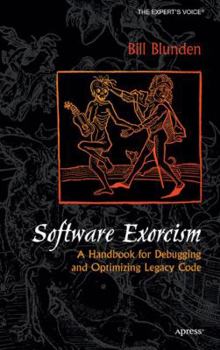Software Exorcism: A Handbook for Debugging and Optimizing Legacy Code (Expert's Voice)
Select Format
Select Condition 
Book Overview
Software Exorcism: A Handbook for Debugging and Optimizing Legacy Code discusses sociological forces that make it difficult for a programmer to do their job. There are plenty of books that discuss "how-to-debug," but these books fall short by mistaking a symptom for the illness. This book takes an unflinching look at the true behavioral problems in software engineering. The brutally honest approach and accompanying illustrations from the dark ages make this book a fascinating read. This is a special title that will be both technically useful and visually stimulating to the reader.
Customer Reviews
Rated 4 starsGood coverage of software maintenance, techniques and tools from personal perspective
In his book Bill Blunden covers wide set of software maintenance techniques, tools and methods from his very personal perspective. Now, in year 2010 some of the material seems little outdated but he does provide very deep historic perspective on software development since early days of 1980s. Is is a book about working with the legacy software after all. I think a young developer faced with perspective of supporting an old...
0Report
Rated 4 starsVery good, but, Heisenberg is watching over him.
Very good! This is not only an amazing technical book but it's also a politician book about the truth behind the software industry. All I have to say is that you must read it before you even think about rate yourself as a "good" programmer. But like everything in life it has only one big problem. The author states that by using a debugger you run out of "Heisenberg principle" and it's not true! The effect that a debugger has...
0Report
Rated 5 starsThis one is REALLY good
Don't give this one to your programming team, they probably won't get it. Don't give it to this year's star programmer, for the same reason. Wait until you find that one kid that always has one more answer than everyone else, and especially the one that has one more question than everyone else. Give that kid this book. This book is about all that ugly stuff that people take pride in ignoring because it's "low level" and they're...
0Report
Rated 5 starsAn Inmate's View of Life in an IT Dungeon
Software Exorcism is a mind-dump by an experienced maintenance programmer. Bill Blunden lists all the horrendous coding techniques he's come across in commercial software, while offering detailed tips on debugging and optimizing code. The very useful code examples are written in C++, C or assembly language, mostly on an Intel platform.The aim of the book is to help computer science and engineering students jump the chasm to...
0Report















